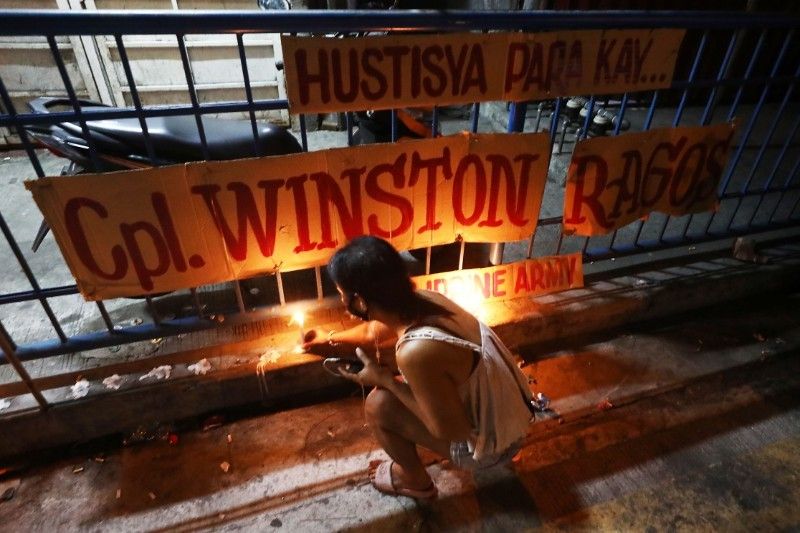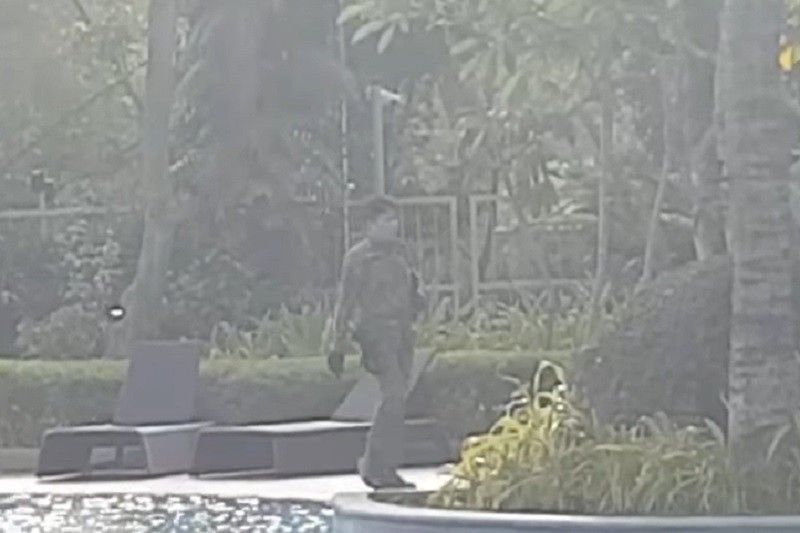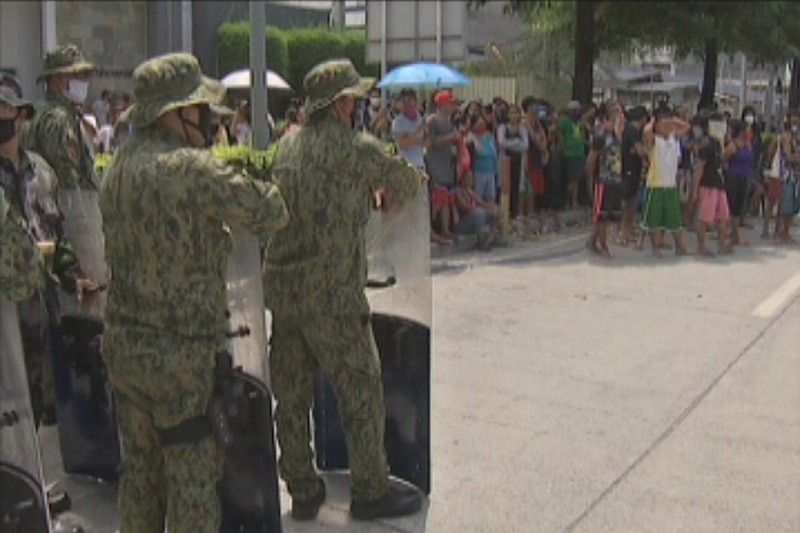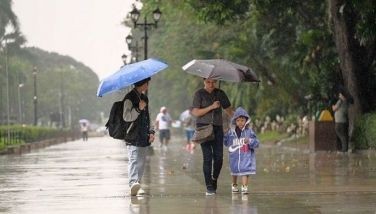'By the book': A look at quarantine incidents and police operational procedures

MANILA, Philippines (Updated 6:43 p.m.) — Police in their camouflage field uniforms have become a common sight on the street and at checkpoints as they enforce the guidelines of the enhanced community quarantine that has since expanded to areas outside of Luzon.
While authorities have said that security personnel have been deployed to ensure compliance with rules on physical distancing, the government narrative of "pasaway" Filipinos and incidents of potential abuse of the authority to enforce quarantine rules has prompted reminders that the campaign is against COVID-19 and not against the people.
As early as his initial community quarantine announcement, President Rodrigo Duterte threatened violators of quarantine rules with jail time but was quick to say it was "not martial law."
By April, the chief executive appealed to members of the general public to discipline themselves in observing social distancing rules, warning that he would issue orders for military and police enforcement that he likened to martial law. He has since said that he may actually declare martial law.
Police Gen. Archie Gamboa, the chief of the national police, said enforcers would be tightening their grip in implementing quarantine procedures and would no longer warn citizens before arresting them.
The Department of Interior and Local Government, under which the Philippine National Police is a bureau, previously assured the public that all police officers would be "courteous and firm and will follow all laws and regulations."
Recent incidents, though, cast doubt on whether law enforcement personnel have been following their own regulations—including the use of field service uniforms usually reserved for "Mobile Group Companies...involved in counter-insurgency operation in rural and forested areas," according to the PNP's own website.
‘I will trust my commanders’: Pacific Plaza incident

On April 19, police officers reportedly barged into a high-end condominium in equally high-end Bonifacio Global City in Taguig to ensure residents' compliance with quarantine rules.
Residents and board members of Pacific Plaza Towers said that the officers showed up at the condominium in uniform, threatened to arrest their security personnel, and screamed at residents who were not wearing face masks that quarantine rules require when leaving home.
READ: PNP: We'll go 'straight to arrests' in 'martial law-type' quarantine
A resident complained on social media that: “Philippine police unlawfully overran our security and forced their way into our community with guns on our private property today screaming at children of diplomats and foreign government dignitaries sitting with their families while waiving (sic) their guns telling them to go away to go in their units with no mask on themselves."
In one video of the incident, a police officer can be heard yelling at residents: "Go back or I will arrest all of you! Can’t you understand the policy of our government? Don’t look at me like that, ah! Just try to cooperate!”
Quarantine rules have not defined what authorities mean by "being outside" and alleged quarantine violators have been penalized for allegedly breaking quarantine protocols while inside their own property.
Chapter 6.1 of the Revised PNP Operational Procedures, a public document, states: "During actual police intervention operations, the Team Leader shall use peaceful means including the use of megaphones or any other similar instruments to warn or influence the offender/s or suspect/s to stop and/or peacefully give up."
“As a policy, police will never come inside a private property unless invited by owner or administrator,” Brig. Gen. Bernard Banac, PNP spokesperson, told Philstar.com then.
PNP chief Gamboa also defended the Taguig police's actions, saying they were just doing their job and that he would trust the judgment of his commanders.
"Not unless the violation is so gross or really flagrant or excessive, then that's the only time I will take cognizance of the case," he said.
The PNP Guidebook on Human Rights-Based Policing reads: "No one shall be subjected to arbitrary interference with his privacy, family, home or correspondence, or to attacks upon one’s honor and reputation."
Unless they have personal knowledge of a crime in the premises, police cannot enter private property without an invitation or a court order.
Speaking in an interview with ANC, though, DILG Undersecretary Jonathan Malaya, who is also the department's spokesperson, said: "In so far as we're concerned, common areas in buildings such as that one, condominiums, are public places, and therefore, they have to conform to the guidelines set by the national government in so far as the prohibition against mass gathering and social distancing is concerned."
Although police can be requested to assist in the implementation of government orders, Rule 28.6—which deals with police assistance in implementing court rulings and similar orders—reminds personnel to "observe maximum tolerance and respect for individual rights at all times."
"Dialogue with those who may be affected by the implementation of the decision/order/resolution is encouraged to prevent violence, and the
assistance of local public officials, when warranted, should be requested," it also reads.
'He started it': Dasmariñas Village
On Monday, videos of an attempted arrest at a gated village in Makati City went viral on social media, showing Dasmariñas Village resident Javier Parra raising his voice at a man in a police field service uniform; a separate video taken later but made public earlier shows Parra being tackled to the ground by the same officer.
Though the foreign national's treatment of the police officer—which Sen. Panfilo Lacson, who was once PNP chief, slammed as arrogant and possibly deserving of deportation—deserves criticism, the incident has also raised concerns because of the attempted warrantless arrest on private property.
Section 6 of the Bill of Rights protects the people's liberty of abode.
Both sides of the narrative say that the altercation began when Parra's househelper was approached for not wearing a face mask as she worked on the lawn. As in the previous incident, no regulations exist obligating citizens to wear masks and observe other quarantine rules on their own property.
INTERAKSYON: Law experts weigh on gated village altercation: Cops cannot enter private property
In a separate video acquired by Philstar.com, Parra's wife is shown pleading with the officer as he attempts to take Parra to the ground.
"He has a back injury, it's life threatening. You cannot arrest somebody in our house, you have to have a warrant," she says.
"I will arrest you too," he is heard saying in response in the video.
For his part, Police Maj. Gen. Debold Sinas, NCRPO chief, in a statement Monday evening backed the PNP's earlier pronouncements, saying the police officer involved "displayed maximum tolerance in handling the incident despite the arrogance" of Parra.
According to the "Use of Force Continuum" that the PNP is supposed to follow, police officers are expected to "use firm language with a moderately loud voice" and :directives or instructions to make the person/group more cooperative or compliant," when faced by a resistant subject like Parra.
"When cooperation or compliance is not attained using verbal directives, cautiously approach the person/group and apply control techniques using only light force," it also reads.
It is notable that Police SMSgt. Roland Madrona, the police officer involved in the incident, did not pull out a truncheon or his service firearm, since these are only authorized when a subject is assaultive—or may cause bodily harm to the officer or to others.
A day after the incident went viral on social media, Interior Secretary Eduardo Año defended Madrona, saying he "did everything by the book."
"If you look at the video, they're not inside the property, they were on the streets. It was already doing the arrest that they went in front of the house. It's allowed by law, it's called hot pursuit... even if the guy went inside the house, if you're arresting somebody, you're allowed by law," Año said in a televised interview with ANC.
RELATED: What is 'hot pursuit' and can the police use it to enter your property?
Asked by Philstar.com what constitutes being "outside" one's residence, the DILG has yet to respond as of this publishing.
While Madrona was accompanied by a barangay watchman, the police manual reminds officers to "strictly observe 'Buddy System' during ... patrol operations."
Miranda Warning
While police may argue that Madrona had the authority to arrest Parra on his property, his attempt to arrest the Spanish national was not according to procedure.
Police officers effecting warrantless arrests are supposed to "inform the arrested person of the circumstances of his arrest and recite the Miranda Warning and Anti-torture Warning to him."
The Miranda Warning includes informing the person being arrested of what crime they are being arrested for and also informs them of the following rights:
- The right to remain silent
- The right to have a competent and independent counsel preferably of [their] own choice
- If the person cannot afford the services of a counsel, the government will provide one for them
The police officer is also supposed to ask the person if they understand those rights.
The PNP has trasnlations of the Miranda Warning in Filipino, Ilocano, Kapampangan, Bicolano, Hiligaynon, Waray, Cebuano, Tausug, Maranaw, and Chavacano.
The Anti-Torture Warning informs the person being arrested that they have the right "to demand physical examination by an independent and competent doctor of [their] choice" or by one appointed by the State.
‘Self-defense’: Shooting of Army veteran
A week before the Dasmariñas Village incident, police shot dead 34-year-old army veteran former Cpl. Winston Ragos, allegedly in self-defense, after a confrontation over quarantine rules.
"The police ordered Ragos to yield peacefully, but instead of heeding to a lawful order, he attempted to pull out his handgun prompting Police MSgt. Daniel Florendo to disable Ragos," QCPD said in a statement sent to Philstar.com.
READ: Quezon City cop shoots 'mentally challenged' quarantine violator
Police Brig. Gen. Ronnie Montejo, director of the Quezon City police, tagged the shooting as a "judgment call," while PNP spokesman Banac asserted that "the suspect really had a gun in his bag. And our police are strictly enforcing quarantine."
However, Rules 7.4 and 7.5 of the PNP Operational Procedures hold that:
"When suspect is violent or threatening, and that less physical measures have been tried and deemed inappropriate, a more extreme, but non-deadly measure can be used such as baton/truncheon, pepper spray, stun gun and other nonlethal weapon to bring the suspect under control, or effect an arrest.
During confrontation with an armed offender, only such necessary and reasonable force should be applied as would be sufficient to overcome the resistance put up by the offender; subdue the clear and imminent danger posed by him; or to justify the force/act under the principles of selfdefense, defense of relative, or defense of stranger."
Rule 7.6 reads: "A police officer, however, is not required to afford offender/s attacking him the opportunity for a fair or equal struggle. The reasonableness of the force employed will depend upon the number of aggressors, nature and characteristic of the weapon used, physical condition, size and other circumstances to include the place and occasion of the assault. The police officer is given the sound discretion to consider these factors in employing reasonable force."
Rule 7.2 of the police manual also directs officers to "first issue a verbal warning" before resorting to force, but also says that failure to give a verbal warning is excusable "where threat to life or property is already imminent" and cops are given no choice.
Speaking in an interview with ANC, Gamboa bared the same directive, saying: "When you are confronted with a person armed with a pistol, it's equivalent is also a pistol...my instruction is really don't let the other person go first."
Police MSgt. Daniel Florendo, the cop who shot Ragos, is already facing a homicide complaint filed by the Quezon City Police District.
Securing the crime scene
Videos of the shooting showed Florendo had already drawn his gun even though it was not clear whether Ragos was armed. Police said a revolver was later found when they searched his bag.
Police procedure holds that first responders like Florendo are are supposed to "secure and preserve the crime scene by cordoning off the area to prevent unauthorized entry of persons" but police leadership have said police took Ragos' bag to preserve the evidence.
First responders are also "mandated to save and preserve life by giving the necessary first aid measures to the injured and their medical evacuation as necessary."
RELATED: QC cop who killed ex-soldier 'followed instruction' — PNP chief
‘Political agenda’: Arrest of 21 protesters
 In early April, 21 residents of Sitio San Roque— an urban poor community in Barangay Bagong Pag-asa in Quezon City—were arrested after they held a sponteneous protest demanding food and financial aid, which was promptly dispersed by the Quezon City Police District.
In early April, 21 residents of Sitio San Roque— an urban poor community in Barangay Bagong Pag-asa in Quezon City—were arrested after they held a sponteneous protest demanding food and financial aid, which was promptly dispersed by the Quezon City Police District.
Firsthand accounts of the dispersal said that police violently hit the protesters—which included women—during the dispersal.
Police reports after the incident said: "The QCPD further reiterates the stern warning of the PNP of firm and decisive police action against those who will organize and join illegal mass actions amid the state of national emergency."
READ: Kadamay unfairly blamed for Sitio San Roque protest, group and supporters say
According to police reports, the 21 faced charges for violating the Bayanihan Heal as One Act and the Mandatory Reporting of Notifiable Diseases and Health Events of Public Health Concern Act, among others.
Public assembly is strictly prohibited by virtue of Republic Act No. 11469.
Rule 25.1(i) of the PNP Operational Procedures reads: "Maximum tolerance shall be exercised in the conduct of dispersal operations. Violators of the law shall be apprehended and brought to the nearest Police Station for proper disposition," while Rule 25.6(a) prohibits police officers from "obstructing, impeding, disrupting or otherwise denying the exercise of the right to peaceful assembly."
Crowd dispersal procedure
Police are supposed to "exhaust all peaceful remedies to persuade the demonstrators to disperse" and may ask local government officials and community leaders to intervene and convince people to go home.
"Should negotiation fail and the demonstrators refuse to disperse voluntarily and peacefully, thereby causing public inconvenience, CDM (Civil Disturbance Management) contingents may commence dispersal operations," the operations manual also reads.
CDM personnel are supposed to wear protective gear during dispersal, although videos of the April 2 incident showed few police officers wearing helmets. Most of the police personnel involved in the dispalcement were in field uniforms and were armed with truncheons.
The PNP Guidebook on Human rights-based Policing reminds police officers conducting crowd control to "only hit the resisting person(s) on fleshy or thick portions of
the arms, torso, thighs, and legs" since hitting the head and other vulnerable areas could lead to serious injury.
"Police officers must take extra care in the conduct of arrests or in the use of non-lethal weapons since minors and innocent civilians might be affected during dispersal or any other necessary police action," the guidebook also reads.
"Any loss of emotional control, unprofessional conduct, and excessive use of force by members of PNP crowd control (CDM) units is highly counter-productive and causes negative perception towards the police organization," it also reads.
The ECQ in Luzon has prohibited mass gatherings like rallies, a precaution that rights groups and lawyers have acknowledged as necessary.
'Pasaway', 'nanlaban'
A common narrative in the four cases and in many arrests throughout the enhanced community quarantine is that those involved had disobeyed quarantine rules.
Some were charged with either Article 151 of the Revised Penal Code, which prohibits resistance and disobedience to a person in authority or the agents of such person, or with violation of quarantine under the Bayanihan Heal as One Act.
RELATED: Hontiveros, Elago say they could not 'blindly trust' government with emergency powers
Similar to the "nanlaban" narrative in the campaign against illegal drugs, public officials have been steadily ramping up the narrative that the dire COVID-19 situation is largely due to Filipinos being "pasaway" and stubbornly ignoring quarantine guidelines.
In the past week, both the DILG and the PNP have said that even relief volunteers could be arrested if they fail to show certification from the local government unit they paln to help.
Asked about gated subdivisions in a press briefing Tuesday morning, Sinas said: "A lot of them cooperate anyway. They are not exempted from ECQ guidelines. Sometimes they're stubborn and don't want to let the police in." — with reports from Gaea Katreena Cabico and Kristine Joy Patag
RELATED: 'Unauthorized' relief volunteers face fines, arrest
If you believe you have come into possible contact with infected patients, you may be directed to the proper office of the Department of Health for advice through the following lines: (632) 8651-7800 local 1149/1150 or (632) 165-364.
You may also opt to call the Research Institute for Tropical Medicine at (02) 8807-2631/ 8807-2632/ 8807-2637. The general public has also been encouraged to forward its concerns to the Health Department's dedicated 24/7 COVID-19 hotlines (02) 894-COVID and 1555 (free for all subscribers).
- Latest
- Trending
































